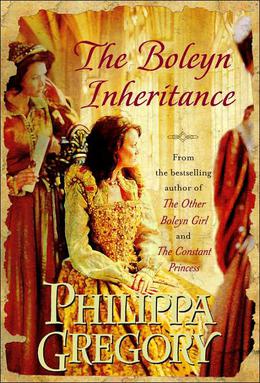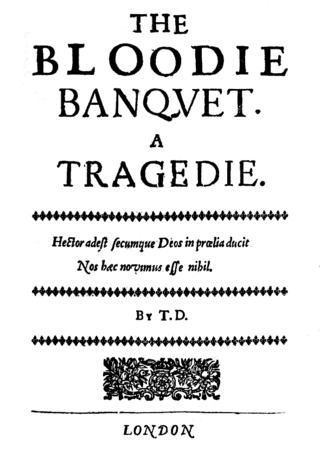John Webster was an English Jacobean dramatist best known for his tragedies The White Devil and The Duchess of Malfi, which are often seen as masterpieces of the early 17th-century English stage. His life and career overlapped with Shakespeare's.

Thomas Dekker was an English Elizabethan dramatist and pamphleteer, a versatile and prolific writer, whose career spanned several decades and brought him into contact with many of the period's most famous dramatists.

John Ford was an English playwright and poet of the Jacobean and Caroline eras born in Ilsington in Devon, England. His plays deal mainly with the conflict between passion and conscience. Although remembered primarily as a playwright, he also wrote a number of poems on themes of love and morality.

Karin Månsdotter was first a mistress of King Eric XIV of Sweden and then briefly queen as his wife.

The London Prodigal is a play in English Renaissance theatre, a city comedy set in London, in which a prodigal son learns the error of his ways. The play was published in quarto in 1605 by the stationer Nathaniel Butter, and printed by Thomas Creede. In 1664 it was one of the seven plays that publisher Philip Chetwinde added to the second impression of his Third Folio of William Shakespeare's plays.

A Song about Tsar Ivan Vasilyevich, the Young Oprichnik, and the Valorous Merchant Kalashnikov, often abbreviated as The Song of the Merchant Kalashnikov, is a poem by Mikhail Lermontov written in 1837 and first published in 1838.

The Honest Whore is an early Jacobean city comedy, written in two parts; Part 1 is a collaboration between Thomas Dekker and Thomas Middleton, while Part 2 is the work of Dekker alone. The plays were acted by the Admiral's Men.

The Maid's Tragedy is a play by Francis Beaumont and John Fletcher. It was first published in 1619.

Mistress Nell Quickly is a fictional character who appears in several plays by William Shakespeare. She is an inn-keeper, who runs the Boar's Head Tavern, at which Sir John Falstaff and his disreputable cronies congregate.

The Shoemaker's Holiday or the Gentle Craft is an Elizabethan play written by Thomas Dekker. The play was first performed in 1599 by the Admiral's Men, and it falls into the subgenre of city comedy. The story features three subplots: an inter-class romance between a citizen of London and an aristocrat, the ascension of shoemaker Simon Eyre to Lord Mayor of London, and a romance between a gentleman and a shoemaker's wife, whose husband appears to have died in the wars with France.
The Spanish Gypsy is an English Jacobean tragicomedy, dating from around 1623. The play was likely a collaboration between several dramatists, including Thomas Middleton, William Rowley, Thomas Dekker, and John Ford. Like Shakespeare's lost play Cardenio, The Spanish Gypsy is an English reworking of the novellas of Miguel de Cervantes, combining two of Cervantes' Novelas Ejemplares into a single drama.

The Boleyn Inheritance is a novel by British author Philippa Gregory which was first published in 2006. It is a direct sequel to her previous novel The Other Boleyn Girl, and one of the additions to her six-part series on the Tudor royals. * The novel is told through the first-person narratives of – Anne of Cleves, Katherine Howard, and Jane Boleyn, who was mentioned in The Other Boleyn Girl. It covers a period from 1539 until 1542 and chronicles the fourth and fifth marriages of King Henry VIII of England.

The Bloody Banquet is an early 17th-century play, a revenge tragedy of uncertain date and authorship, attributed on its title page only to "T.D." It has attracted a substantial body of critical and scholarly commentary, chiefly for the challenging authorship problem it presents. It has been attributed to a collaboration between Thomas Dekker and Thomas Middleton.
Thierry and Theodoret is a Jacobean era stage play, a tragedy in the canon of John Fletcher and his collaborators that was first published in 1621. It is one of the problematic plays of Fletcher's oeuvre; as with Love's Cure, there are significant uncertainties about the date and authorship of Thierry and Theodoret.
A Wife for a Month is a late Jacobean era stage play, a tragicomedy written by John Fletcher and originally published in the first Beaumont and Fletcher folio of 1647.

Hope Logan is a fictional character from The Bold and the Beautiful, an American soap opera on the CBS network. The character was portrayed by several child actors since Hope's introduction in 2002, most notably Rachel and Amanda Pace. In 2010, the role was rapidly aged and recast with actress Kim Matula, who made her first appearance in January 2010. Matula departed the serial as a series regular in December 2014, but she made guest appearances in 2015 and 2016. As of 2018, the role is portrayed by Annika Noelle.
"To the Queen" is a short 18 line poem praising Queen Elizabeth I attributed to William Shakespeare. It was included in 2007 by Jonathan Bate in his complete Shakespeare edition for the Royal Shakespeare Company.
The Noble Spanish Soldier (1622) is a Jacobean play written by English author Thomas Dekker.

Cordel Encantado is a Brazilian telenovela produced and broadcast by TV Globo from 11 April to 23 September 2011. It has been re-aired in Globo's Vale a Pena Ver de Novo since 14 January 2019.












